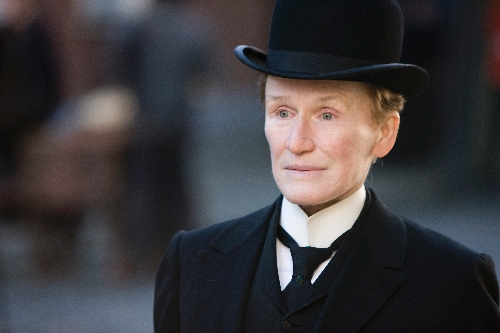Surfaces, appearances play determining factor in people’s lives in ‘Albert Nobbs’

Clothes make the man.
Or, in the case of "Albert Nobbs," the woman pretending to be the man.
An invisible man, to be sure. Or as invisible as the woman who inhabits him can possibly make him.
The irony being that Glenn Close, who plays "Albert Nobbs’ " title role, is far from invisible as she brings this almost anonymous lost soul to life.
"Albert Nobbs" ranks as a genuine labor of love for Close, who first played the role off-Broadway, winning an Obie Award for her performance in 1982 — the same year she made her big-screen debut in "The World According to Garp." Now, 30 years later, she’s up for a best actress Oscar for the same role.
Close has reportedly been trying to bring "Albert Nobbs" to the screen for about 15 years — and finally gets her chance, co-producing and co-writing the adaptation of a short story by Irish writer George Moore. (Close even co-writes the mournful lullaby "Lay Your Head Down," sung by Sinead O’Connor, that plays over the end credits.)
A waiter by profession, Albert Nobbs spends his life waiting.
During working hours, he attends guests at a Victorian-era Dublin hotel, most of whom hardly notice his unblinking, unobtrusive presence. ("Such a kind little man," one guest remarks.)
After hours, Nobbs retreats to his attic room and counts his tips, adding the shillings and pence to a hidden stockpile of savings that, some day, may enable him to buy a small tobacconist’s shop and control his own fate.
To do so, Albert must maintain a life of constant, corseted restraint.
Albert’s been Albert for so long that we never learn his — make that her — true identity. (Or at least the identity she had before she became Albert.)
Moreover, he’s repressed his emotions for so long that, when circumstances conspire to awaken them, he doesn’t quite know how to react to them — or to the inevitable heartbreak that awaits.
The plot complications triggering that heartbreak may be melodramatic in the extreme. But "Albert Nobbs" (scripted by Gabriella Prekop, John Banville and Close) plays the accompanying emotions very close to the vest.
As directed by Rodrigo Garcia (whose Close collaborations include "Nine Lives" and "Things You Can Tell Just By Looking at Her"), the entire movie reflects its title character’s tightly wound, tightly bound existence.
It’s a world where surfaces and appearances play a determining factor in people’s livelihoods — and lives.
That explains the saucy look-the-other-way dance performed by the hotel’s sly hotel owner (Pauline Collins) and its most prominent guest, a viscount (Jonathan Rhys Meyers) with decidedly scandalous ways.
Or the way the hotel doctor (gruff, gentle Brendan Gleeson) accepts others’ foibles the way he does his own.
Keep watching, however, and even more telling details emerge.
Echoing "Albert Nobbs’ " title character, director Garcia (son of author Gabriel Garcia Marquez) devotes himself to quiet observation.
There’s Albert’s isolation and repressed desperation, to be sure.
But there’s also his (foolish) hopes for an end to that loneliness — in the person of the fetching chambermaid Helen ("Jane Eyre’s" winsome Mia Wasikowska).
Alas, she only has eyes for handsome scrapper Joe ("Nowhere Boy’s" Aaron Johnson), who has his own dreams of going to America and building a better life — with or without her.
Albert also has dreams of building a better life — especially after a revealing encounter with feisty painter Hubert Page (Close’s compelling "Damages" co-star, Janet McTeer, a best supporting actress Oscar nominee), who’s managed to overcome life’s slings and arrows with humor and heart intact.
That McTeer towers over Close, figuratively as well as literally, throws "Albert Nobbs" a bit off-balance, her sadder-but-wiser resilience providing powerful contrast to the title character’s reticent anguish.
Yet it’s a tribute to Close’s commitment to the movie that she steadfastly resists the temptation to abandon restraint.
Rather than succumb to showy, in-your-face histrionics, Close dials down the outward signs of Albert’s divided life; the character’s stiff, still reserve suggests an identity repressed for so long it may no longer exist.
Until, of course, you notice Albert’s restless, wounded eyes — and ponder everything they’ve seen, and absorbed, and been forced to accept, just to maintain life’s masquerade.
Talk about walking a mile in someone else’s shoes.
Contact reporter Carol Cling at ccling@reviewjournal.com or 702-383-0272.